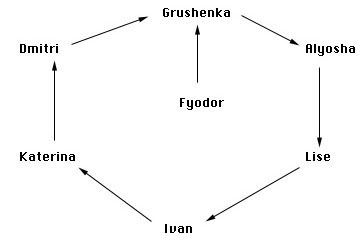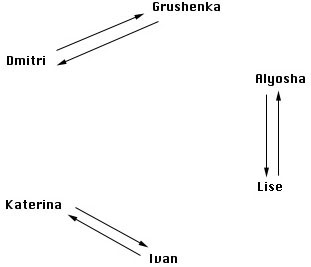General Plot Summary

- * PART ONE
- * PART TWO
- * PART THREE
- * PART FOUR
- * EPILOGUE
PART ONE
Part I sets the scene by introducing the main characters of the novel. Fyodor
Karamazov is introduced as many things, a buffoon, a philanderer, and in
the lightest sense a father to three (legitimate) sons: Dmitri, Ivan and
Alexei. From the first paragraph of the book the reader knows that Fyodor
will be murdered, and subsequent pages of this section serve only to make
the reader glad that this vile creature's existence will soon come to an
end. The endless cruelty, which this man shows not only to his wives (both
dead) but to their offspring, is astonishing. While none of the boys have
a mother left, Fyodor has managed to pass them all off to outside rearing,
except for Smerdyakov, who he employs as a servant. All three brothers have
come back home for various reasons after being reared by different people
all over Russia. Ivan has become an intellectual who questions faith and
religion. Dmitri has become a soldier and a sensualist much like his father.
Alyosha (Alexei) has adopted the world of god and lives at the monastery
following the teachings of Father Zossima. A meeting is set up between Father
Zossima and the Karamazov family during which Fyodor manages to make a constant
fool of himself. Father Zossima tells Alyosha that he should go out into
the world in order to do well. The story of Smerdyakov is introduced as
we find out that Fyodor is rumored to be his father after having slept with
the town idiot, "stinking Lizaveta," the now-deceased mother of
Smerdyakov.
PART
TWO
As Father Zossima nears death he gathers a last congregation around him
in his cell. It is here that the reader gets the closest interpretation
of what it is that the elder prescribes for humanity. He talks about the
holy community and the responsibility of its members. Having done this,
father Zossima dispatches Alyosha once again in order to fulfill his duties
to his father and brothers, namely to mend their feuding. Alyosha first
visits his father, who is talking about conserving his money in order to
attract young women. On his way out, Alyosha meets a boy, later identified
as the young Ilyusha Snegiryov, who is having rocks thrown at him by his
schoolfellows. The boy will come up again later as the son of the captain
beaten by Dmitri. Alyosha stops by the Madam Khokhlakov's house, to which
Lise has summoned him. He speaks with Katerina, who says that she will never
leave Dmitri, and Ivan decides to leave for Moscow. Alyosha then goes off
under Madam Khokhlakov's orders to give 200 rubles to the captain that Dmitri
roughed up a few days earlier. It is upon going (actually failing) to do
this that Alyosha sees the schoolboy again who turns out to be the captain's
son. When all of this is over, Alyosha gets a final sitting with Father
Zossima before the elder dies.
PART
THREE
Part Three attacks two greater themes. First, the death of Father Zossima
in Part Two attains post-mortem significance as the body begins to putrefy
almost immediately after death, signifying possible corruption. This of
course creates a great stir, and the monastery and religious society find
themselves divided among those who were for and against the father in life.
For Alyosha, the death and rapid putrefaction have, of course, a very deep
significance -- the effect of all this being a crisis of faith. Alyosha
then goes on to accept sausage and vodka from Grushenka in a contradiction
to Lenten ritual. Grushenka and Alyosha spend some time together and slowly
develop a close relationship, with undertones of sensuality. Meanwhile,
the second grand theme of Part Three is the announcement of Fyodor's murder
and the subsequent arrest of Dmitri (who we know killed Grigory, but know
nothing as to his involvement with the murder of his father). Dmitri is
hauled off to prison where, instead of maintaining his innocence, he decides
that he is somewhat guilty of his father's murder. Although they do not
bear direct responsibility, Dmitri, Grushenka and later Ivan will all feel
a portion of guilt and suffering over the death of Fyodor. The interesting
part about Book Three is its illustration of Father Zossima's mark on humanity
even in passing. Many in the novel seem not only to understand but also
to embrace the late elder's philosophy. Dmitri, who is stuck in jail, feels
responsible for the actions of other humans. Grushenka feels guilty for
having tampered with the relationship between Old Karamazov and Dmitri.
Alyosha understands that his faith should not have to rest on the miracle
that Zossima should be preserved for longer than he was -- in short, that
faith should not necessitate miracles. Finally, even Lise feels that she
must suffer and repent as she slams her fingers in the door in an act of
blatant self-violence. All come to believe that suffering is the only road
to spiritual purity.
PART
FOUR
Part Four carries the reader through the long awaited trial of Dmitri Karamazov.
The opening book of Part Four, as a short anecdote unto itself, serves as
an interlude and affords some respite from the otherwise heavy and dramatic
story line of the book. The story of a dying boy, Ilyusha, brings out a
tender sentimentality that has been previously lacking in the book. The
story repeats the theme of Alyosha's involvement in teaching and influencing
the youth. Heading back toward the central plot of the story, Dmitri has
been in jail for two months and it seems that most of the main characters
are
caught up in heavy emotional grief. Dmitri is convinced that his salvation
will come through suffering. Ivan is tortured by the pangs of his conscience
as he realizes that he himself played a large part in the murder of old
Karamazov. Ivan understands his guilt in the matter and ultimately ends
up incriminating himself to a certain extent (although nothing really comes
of his admitted involvement). Smerdyakov, ultimately bearing the guilt for
the murder, kills himself, no one cares, and Ivan, Grushenka, Alyosha and
Katerina all testify to the upstanding character of Dmitri. In the end,
Katerina produces the note that will eventually condemn Dmitri in her efforts
to shield her own beloved, Ivan, from implication in the murder. She thinks
that Ivan only came to the rescue of his brother in a nervous fit, and that
he did not intend to free Dmitri at his own expense. As in any conclusion,
it is to be expected that Part Four hopes not only to provide closure to
the story but also to proclaim Dostoevsky's words of wisdom and guidance.
Other works by the author have indicated, however, that this may not be
his strongest suit. Bringing issues to light and proving a position is often
much easier than prescribing a cure. In The Brothers Karamazov the potential
evil of humanity is boldly illustrated. The cure may indeed lie within a
love for humanity and the teachings of societal responsibility. It is only
when the group feels societal consciousness that evil can be eradicated.
In effect, we must help one another out just as Alyosha attempts to help
his family, the children, and all the other personalities he comes into
contact with. If this concept of societal rather than individual guilt is
the key to salvation then it becomes necessary to uphold a global human
superconscience.
EPILOGUE
Katerina ends up asking Dmitri's forgiveness just after Dmitri decides that
he will indeed escape to America (with the help of Ivan) for a while and
bear the burden of an exile. Alyosha, who has consistently been the voice
of moral probity, is last seen walking off with the children he will undoubtedly
mold in Father Zossima's image.



